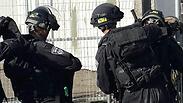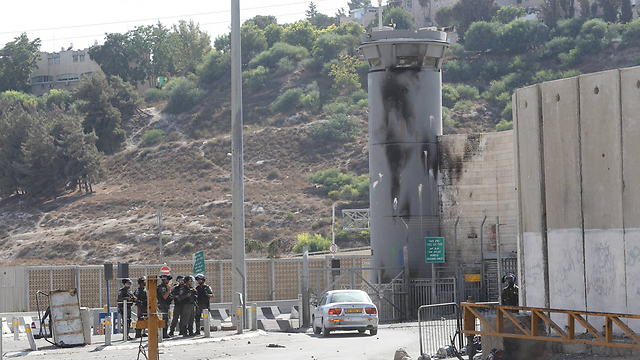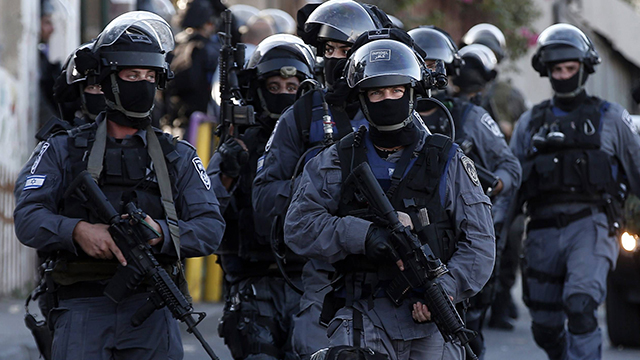
Israeli special police during clashes in East Jerusalem.
צילום: חסן שעלאן
Israeli residency proposal unnerves Jerusalem's Palestinians
An Israeli proposal that could potentially strip tens of thousands of Palestinians in Jerusalem of their residency rights has sent shudders through the targeted Arab neighborhoods -- areas that fell outside Israel's separation barrier a decade ago, even though they are within the city's boundaries.
An Israeli proposal that could potentially strip tens of thousands of Palestinians in Jerusalem of their residency rights has sent shudders through the targeted Arab neighborhoods -- areas that fell outside Israel's separation barrier a decade ago, even though they are within the city's boundaries.
The government's review of the status of these neighborhoods, home to tens of thousands of people, illustrates the fragile position of Palestinians in a city where they are caught between the pragmatic conveniences of living under Israeli control and the loyalties to the Palestinian cause.

Shuafat refugee camp, within Jerusalem's municipal boundaries but on the other side of the separation wall. (Photo: Gil Yohanan) (צילום: גיל יוחנן)
With few exceptions, Jerusalem's Palestinians are not Israeli citizens, and instead hold residency status that can be revoked. Removing residency rights en masse appears highly unlikely due to legal hurdles and domestic and international opposition. But government critics said the fact that it is even being discussed sent an ominous message to Palestinians.
"There is nothing permanent about permanent residency," said Yudith Oppenheimer, executive director of Ir Amim, an advocacy group that promotes coexistence and equality in the city. "This is another reminder for them how conditional that status is."
Prime Minister Benjamin Netanyahu ordered the review at a recent meeting that was called to discuss a wave of Israeli-Palestinian violence that has roiled the area in the past month. About a third of the city's 300,000 Palestinians live in these neighborhoods.
An official who attended the meeting said the review would look at "all the issues" affecting these neighborhoods, including residency rights, which are coveted by Palestinians because they allow them to work and move freely inside Israel and gain access to Israeli healthcare and social services. The official, speaking on condition of anonymity because he was not authorized to discuss internal deliberations, said the latest violence had exposed a "vacuum" in these outlying neighborhoods, which have a minimal Israeli presence but are not considered West Bank territory.
"We are part of the Palestinian people. We are Jerusalemites, and we will remain in Jerusalem until a political solution is found," said Munir Izghayer, a community leader in the Kufr Aqab neighborhood.

Israeli special police units during clashes in Jabal Mukaber in East Jerusalem. (Photo: AFP) (צילום: AFP)
"They are building everywhere here to find places for poor Jerusalemites to live in because if they move to the West Bank, their IDs will be taken" said Mohammed Samarah, a 59-year-old unemployed restaurant worker, pointing to a new 12-story high-rise in Kufr Aqab.
Samarah, who grew up in Jerusalem's Old City, said he now fears that Israel is plotting to take away his residency rights, which include unemployment assistance of about $600 a month. Since 1967, Israel has stripped some 14,000 Palestinians of residency, mostly in cases of people who have moved away, even to the West Bank, for more than seven years.
"I'm very concerned about my ID. The only way to protect it is to go and live inside Jerusalem, but I don't have money. It's very expensive to live out there. I will wait and see," he said.
But most important, he said he was concerned about losing his connection to the Old City -- site of the Al-Aqsa Mosque, an important Palestinian national symbol that has been at the center of the latest unrest.
"I want the ID to go to the Old City, to the Al-Aqsa Mosque, to the place of my childhood," he said.
Netanyahu's office declined to comment on his plans. Mayor Nir Barkat's office also refused to discuss Netanyahu's latest proposal, though in the past the mayor has said he has worked hard to narrow the gaps between the city's western and eastern sections.










